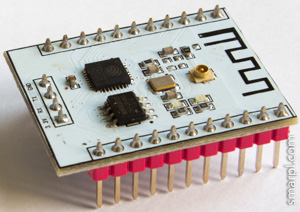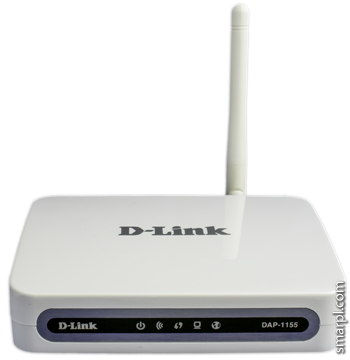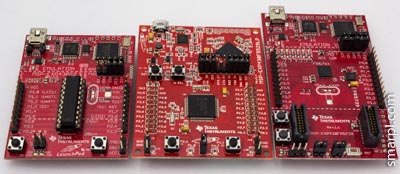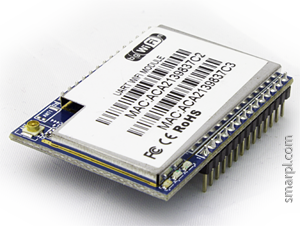Submitted by smarpldotcom on Tue, 01/27/2015 - 17:30

I've been experimenting with different ESP8266 (mostly ESP-01) modules already for some time. As soon as ESP-201 became available I ordered them and yesterday received the long awaited package. And I was not disappointed. The ESP-201 module is a really good choice for prototyping ESP8266 projects.
The size of the board is 25x35mm, totally it has 26 pins with 0.1' (2.54mm) pin spacing. ESP-201 is equipped with on-board antenna and U.FL connector for the external antenna, which also was included in package.
Compared to ESP-12 this module has 6 more pins broken out - D0, D1, D2, D3, CLK, CMD (GPIO6-GPIO11).
Submitted by smarpldotcom on Wed, 01/14/2015 - 20:00
 Some time ago I bought this wireless device at local supermarket. Mostly because of it's price (it was on big sale for only €6.50). The plan was to upgrade it with custom firmware (OpenWrt) and find out if it is suitable for my Internet of Things (IoT) projects.
Some time ago I bought this wireless device at local supermarket. Mostly because of it's price (it was on big sale for only €6.50). The plan was to upgrade it with custom firmware (OpenWrt) and find out if it is suitable for my Internet of Things (IoT) projects.
It appears that this device is based on Realtek RTL8196C system-on-chip, which is not officially supported by OpenWrt. But I found there is individual successful attempt to build OpenWrt for RTL8196C - https://git.nprove.in/rtl819xx/ (link currently dead).
Finally after several attempts I succeed building OpenWrt firmware for the DAP-1155 router. Additionally I made some useful hardware modifications.
Submitted by smarpldotcom on Sat, 12/20/2014 - 17:44
 Bitlash is an interpreted language shell and embedded programming environment for the Arduino. Originally Bitlash is written by Bill Roy and is released under the MIT Open Source license. See Bitlash home page for more details.
Bitlash is an interpreted language shell and embedded programming environment for the Arduino. Originally Bitlash is written by Bill Roy and is released under the MIT Open Source license. See Bitlash home page for more details.
I have ported Bitlash code for the Texas Instruments MSP430 series MCUs. The project depends on Energia framework. The code is kept compatible with Arduino. So far supported chips are MSP430G2553, MSP430F5529 and MSP430FR5739. Potentially Bitlash can run on any MSP430 MCU with at least 16kB of flash or FRAM for the code and 512 bytes (better 1kB) of RAM.
Submitted by smarpldotcom on Mon, 12/08/2014 - 19:20
 RT5350 based HLK-RM04 board is a small and cheap embedded module which can run OpenWrt. As it contains GPIOs, UART, I2C, USB host, WiFi and 100BASE-TX it's a good option for Internet of Things (IoT) devices.
RT5350 based HLK-RM04 board is a small and cheap embedded module which can run OpenWrt. As it contains GPIOs, UART, I2C, USB host, WiFi and 100BASE-TX it's a good option for Internet of Things (IoT) devices.
I've been using the HLK-RM04 board in several home automation projects and created improved version of bootloader for it.
Submitted by smarpldotcom on Mon, 12/08/2014 - 08:50
Welcome to my blog. Here I'm going to share the details of various projects I'm working on. My area of interest includes embedded electronics and software, wireless communications, Internet of Things and home automation.
I would very much appreciate your comments and thoughts.
Pages